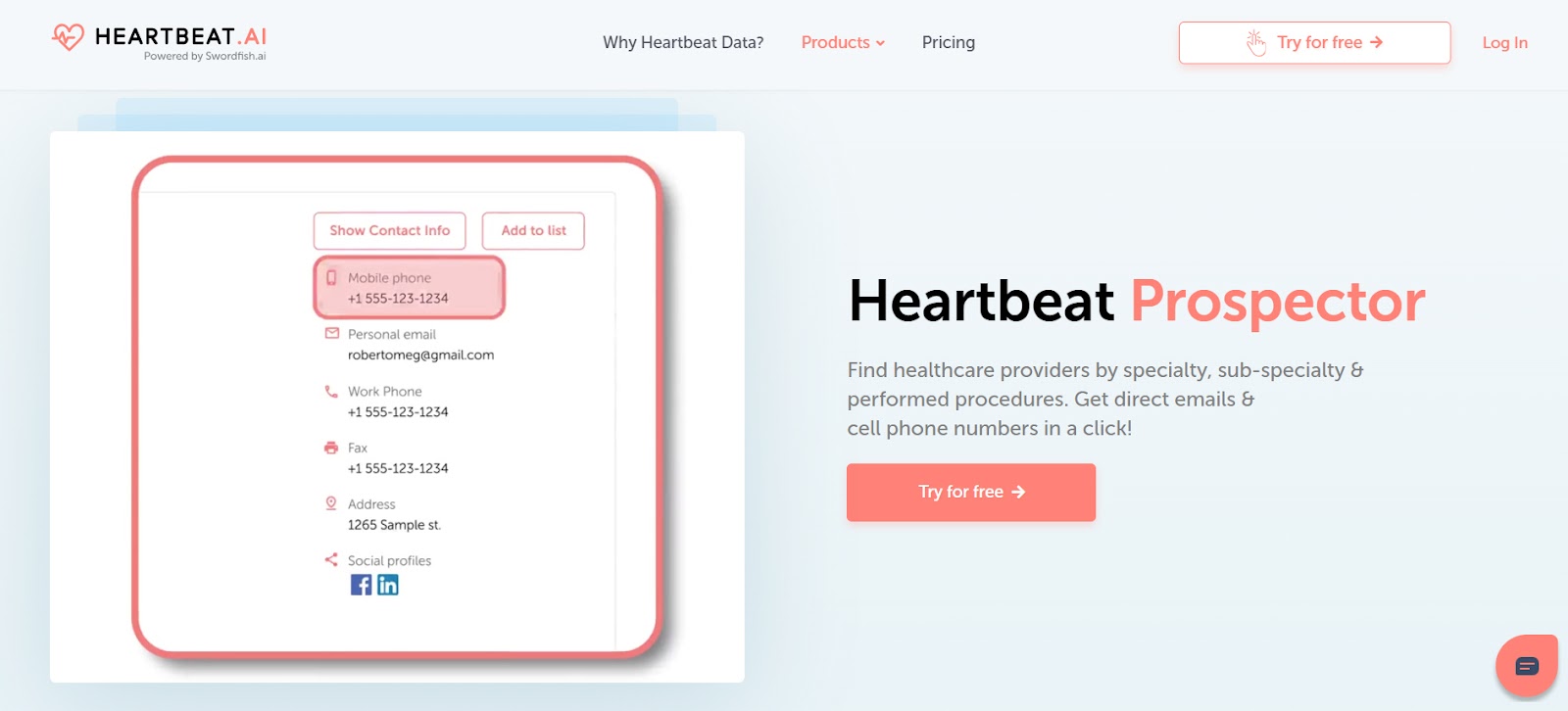Uncover how Healthcare Marketers are gaining a competitive edge by obtaining elusive Doctors' personal cell phone numbers and email addresses. The Heartbeat AI data platform accelerates targeted outreach and engagement, driving more successful medical marketing campaigns.
BOSTON, MA / ACCESSWIRE / July 13, 2024 / Healthcare marketing is a highly competitive field where reaching the right audience is crucial for the success of medical campaigns. With the growing number of healthcare providers and the increasing complexity of medical services, marketers need to target their outreach more precisely than ever before. Traditional methods of contacting physicians and doctors often fall short, as these professionals are notoriously difficult to reach. This creates a significant challenge for healthcare marketers aiming to promote their products and services effectively. In this environment, having direct access to physicians' contact information can provide a substantial competitive advantage.

Physician contact lists are revolutionizing healthcare marketing, providing a competitive advantage in securing top medical talent. Image Credit: Dookdui / 123RF.
"Obtaining direct access to hard-to-reach Physicians' and Doctors' personal cell phone numbers and email addresses through Heartbeat AI is giving healthcare and medical marketers a significant advantage. Our data platform facilitates quicker and more effective outreach, ensuring that medical marketing campaigns reach the right audience and achieve greater success," said Ben Argeband, Founder and CEO of Heartbeat AI.
Competition in Healthcare Marketing and the Importance of Direct Physician Contact
Direct access to physicians' and doctors' personal cell phone numbers and email addresses is a game-changer for healthcare industry marketers. It allows for more personalized and timely communication, increasing the likelihood of engagement and response. Physicians are busy professionals who may not always respond to generic marketing emails or messages sent through traditional channels. Having their direct contact information enables marketers to bypass these barriers and connect with them more effectively. This direct communication is essential for ensuring that marketing messages are received, read, and acted upon, thereby driving the success of medical campaigns.
Heartbeat AI: Transforming Healthcare and Medical Marketing
Heartbeat AI is revolutionizing healthcare marketing by providing access to accurate and up-to-date contact information for physicians and doctors. This data platform allows marketers to target their outreach more precisely, ensuring that their messages reach the right individuals. By using Heartbeat AI, healthcare marketers can significantly improve the efficiency and effectiveness of their campaigns.
Accelerating Targeted Outreach and Engagement with Physicians and Medical Professionals
Heartbeat AI's data platform accelerates targeted outreach and engagement by providing comprehensive contact lists of physicians and doctors. This allows healthcare marketers to conduct more targeted and efficient campaigns, reducing the time and resources spent on outreach. With direct access to personal cell phone numbers and email addresses, marketers can craft personalized messages that resonate with their audience. This targeted approach not only improves the chances of engagement but also enhances the overall success of marketing campaigns. Heartbeat AI's platform ensures that healthcare marketers can reach their intended audience quickly and effectively, driving better results.
Key Healthcare and Medical Industry Professional That Marketers Seek Mailing Lists, Email Lists, and Cell Phone Numbers for Outreach Campaigns
Primary Care Physician (PCP): Primary Care Physicians are the first point of contact for patients seeking medical attention. They manage overall patient care, coordinate treatments, and provide referrals to specialists.
Specialist Physician: Specialist Physicians focus on specific areas of medicine, such as cardiology, oncology, or orthopedics. They provide expert care and treatment for complex medical conditions.
Surgeon: Surgeons perform operations to treat injuries, diseases, and deformities. They work in various specialties, including general surgery, neurosurgery, and cardiovascular surgery.
Hospital Administrator: Hospital Administrators oversee the day-to-day operations of hospitals and healthcare facilities. They manage staff, budgets, and ensure compliance with healthcare regulations.
Chief Medical Officer (CMO): The CMO is responsible for overseeing clinical operations within a healthcare organization. They ensure the delivery of high-quality medical care and develop strategies to improve patient outcomes.
Nurse Practitioner (NP): Nurse Practitioners provide primary and specialty healthcare services. They diagnose and treat medical conditions, prescribe medications, and manage patient care.
Physician Assistant (PA): Physician Assistants practice medicine under the supervision of physicians. They conduct physical exams, diagnose illnesses, and develop treatment plans.
Director of Nursing: The Director of Nursing oversees nursing staff and patient care within a healthcare facility. They ensure compliance with nursing standards and improve nursing practices.
Pharmacist: Pharmacists dispense medications, provide drug information, and counsel patients on medication use. They play a critical role in patient care and medication management.
Radiologist: Radiologists specialize in diagnosing and treating diseases using medical imaging techniques such as X-rays, CT scans, and MRIs. They interpret images and provide diagnoses to other healthcare providers.
Anesthesiologist: Anesthesiologists administer anesthesia to patients undergoing surgery or other procedures. They monitor patients' vital signs and ensure their safety and comfort during procedures.
Cardiologist: Cardiologists specialize in diagnosing and treating heart and vascular conditions. They provide both non-invasive and invasive treatments for heart diseases.
Oncologist: Oncologists specialize in the diagnosis and treatment of cancer. They develop treatment plans, including chemotherapy, radiation, and surgery, to manage and treat cancer.
Endocrinologist: Endocrinologists treat hormone-related disorders, such as diabetes, thyroid diseases, and metabolic disorders. They manage complex hormonal imbalances and related conditions.
Gastroenterologist: Gastroenterologists specialize in diagnosing and treating digestive system disorders. They treat conditions affecting the stomach, intestines, and related organs.
Pulmonologist: Pulmonologists specialize in diagnosing and treating lung and respiratory diseases. They manage conditions such as asthma, COPD, and lung infections.
Dermatologist: Dermatologists diagnose and treat skin conditions, including acne, eczema, and skin cancer. They provide both medical and cosmetic treatments for skin health.
Neurologist: Neurologists diagnose and treat disorders of the nervous system, including the brain, spinal cord, and nerves. They manage conditions such as epilepsy, multiple sclerosis, and stroke.
Pediatrician: Pediatricians provide medical care for infants, children, and adolescents. They manage growth, development, and common childhood illnesses.
Psychiatrist: Psychiatrists diagnose and treat mental health disorders. They provide therapy, prescribe medications, and manage mental health conditions such as depression, anxiety, and bipolar disorder.
Ophthalmologist: Ophthalmologists specialize in eye and vision care. They diagnose and treat eye diseases, perform eye surgeries, and prescribe corrective lenses.
Optometrist: Optometrists provide primary vision care, including eye exams and vision tests. They diagnose and treat certain eye conditions and prescribe glasses and contact lenses.
Orthopedic Surgeon: Orthopedic Surgeons treat musculoskeletal system conditions, including bones, joints, and muscles. They perform surgeries to repair injuries and correct deformities.
Urologist: Urologists diagnose and treat urinary tract and male reproductive system disorders. They manage conditions such as kidney stones, prostate issues, and urinary incontinence.
Nephrologist: Nephrologists specialize in diagnosing and treating kidney diseases. They manage conditions such as chronic kidney disease, dialysis, and kidney transplants.
Rheumatologist: Rheumatologists treat autoimmune and inflammatory diseases affecting the joints, muscles, and bones. They manage conditions such as arthritis and lupus.
Obstetrician/Gynecologist (OB/GYN): OB/GYNs specialize in women's health, including pregnancy, childbirth, and reproductive system disorders. They provide prenatal care, perform surgeries, and manage gynecological health.
Pathologist: Pathologists study disease through laboratory analysis of bodily fluids and tissues. They provide diagnoses that inform patient treatment plans.
Emergency Medicine Physician: Emergency Medicine Physicians provide acute care for patients with serious injuries or illnesses. They stabilize patients, perform emergency procedures, and coordinate further care.
Hospitalist: Hospitalists manage the care of hospitalized patients. They coordinate treatment plans, communicate with specialists, and ensure continuity of care during hospital stays.
Medical Director: Medical Directors oversee clinical programs and services within healthcare organizations. They develop policies, ensure compliance with regulations, and improve patient care quality.
The Future of Medical Marketing with Heartbeat AI
The integration of Heartbeat AI into healthcare marketing strategies represents a significant advancement in the field. As the competition in healthcare marketing intensifies, the ability to reach physicians directly will become increasingly valuable. Heartbeat AI provides a solution that addresses this need, offering a reliable and efficient way to connect with hard-to-reach medical professionals. The future of medical marketing will likely see greater reliance on data-driven platforms like Heartbeat AI to maintain a competitive edge. By facilitating direct and effective communication, Heartbeat AI ensures that healthcare marketers can achieve their goals and drive successful campaigns.
Heartbeat AI is a Leading Solution for Finding Direct Contact Information of "Hard-to-Reach" Healthcare and Medical Providers and Professionals
Healthcare marketers are gaining a competitive edge by using Heartbeat AI to obtain direct contact information for physicians and doctors. This access allows for more personalized and timely communication, significantly enhancing the success of medical marketing campaigns. Heartbeat AI's data platform accelerates targeted outreach and engagement, ensuring that marketing messages reach the right audience. As the landscape of healthcare marketing continues to evolve, tools like Heartbeat AI will be essential in maintaining a competitive advantage.
For more information on Heartbeat AI and their sales, marketing, and recruitment tools, visit their website, healthcare blog, or contact them directly.

Find medical and healthcare candidates and prospects in less time with game-changing cell phone number finder accuracy. Image Credit: Heartbeat.ai
About the Healthcare Marketing List-Building Contact Tool Heartbeat AI™
Heartbeat.ai is a premier healthcare recruitment platform that offers direct access to over 11 million healthcare professionals in the United States. Designed to revolutionize the recruitment process, Heartbeat.ai provides verified personal contact information, including email addresses and cell phone numbers, ensuring recruiters can efficiently connect with top-tier candidates.
With advanced search filters, Heartbeat.ai allows users to target healthcare providers by specialization, license, and credentials, making it easier to find the right fit for any healthcare position. The platform's integration with existing Applicant Tracking Systems (ATS) and workflows ensures a seamless user experience, reducing sourcing time and improving recruitment outcomes.
Heartbeat.ai stands out by providing access to the 70% of healthcare professionals not found on traditional platforms like LinkedIn. This expansive reach, combined with the accuracy of its contact data, gives recruiters a significant advantage in building a robust talent pipeline.
The platform's user-friendly interface and powerful search capabilities make it an indispensable tool for healthcare recruiters. By leveraging Heartbeat.ai, recruitment professionals can enhance their talent acquisition strategies, ensuring they connect with the best candidates quickly and effectively.
Founded by CEO Ben Argeband in 2015 as a contact data mining platform, it was then rebranded and evolved into Swordfish AI, and spun off further into Heartbeat AI for specialty medical and healthcare list contact data. The platforms are trusted by over 70,000+ sales, marketing, and recruitment professionals combined, with access to 100's of millions of cell phone numbers.
Unlock Access to Contact Lists of Over 11 Million Healthcare and Medical Professionals.
CONTACT:
Ben Argeband
Founder & CEO
contact@heartbeat.ai
Start Your Free Trial of Heartbeat AI Today:
https://Heartbeat.ai/contact
SOURCE: Heartbeat AI (Heartbeat.ai)
View the original press release on accesswire.com




